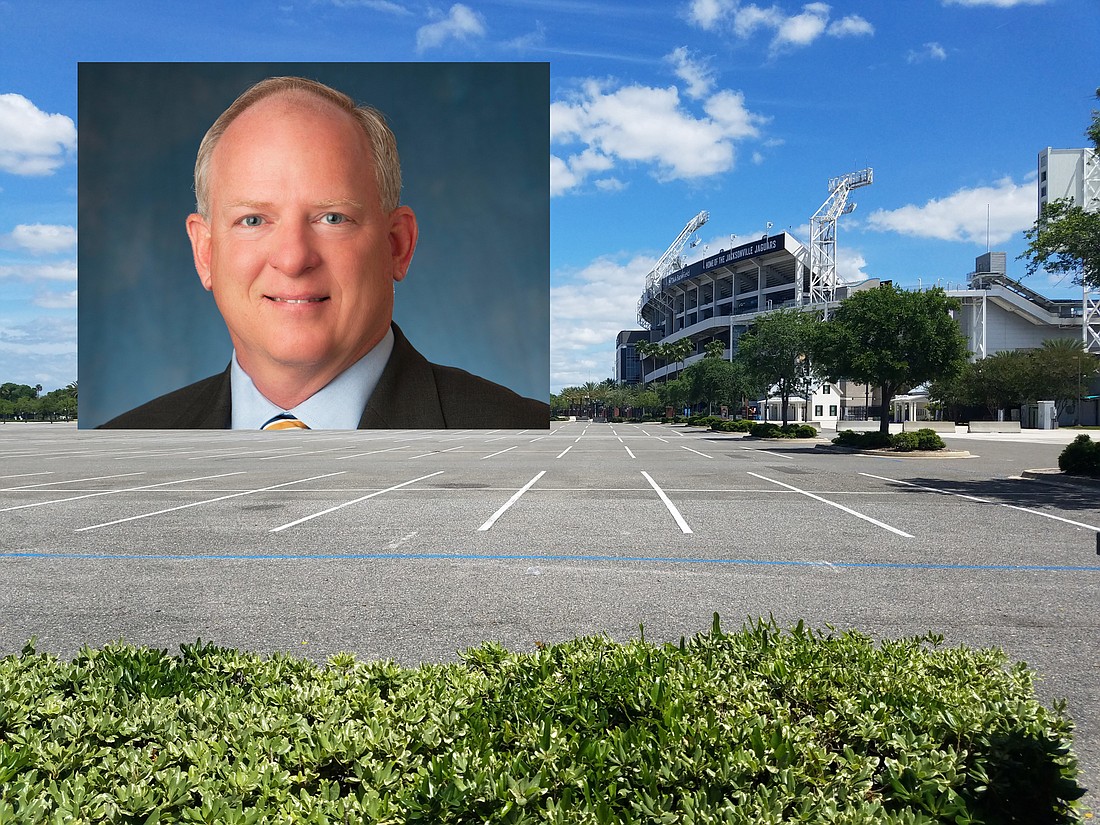
Terms of the city’s proposed agreement with Jacksonville Jaguars owner Shad Khan to develop Lot J released Thursday include a $233.3 million package of incentives.
If approved, the combination of tax rebates, Recapture Enhanced Value grants, a development grant and infrastructure improvements will back the proposed $450 million development of the parking lot west of TIAA Bank Field.
What’s unclear is how the city will pay for the taxpayer-backed deal.
District 3 City Council member Aaron Bowman chairs the Finance Committee, which will lead the council’s review of the deal.
Bowman, a second-term Republican, said Thursday that he had not read all the details of the proposed agreement, but he is supportive of the Lot J project.
Developer Jacksonville I-C Parcel One Holding Company LLC — a joint venture of Gecko Investments LLC, an affiliate of the Jacksonville Jaguars, and The Cordish Companies — plans a 300-unit residential tower, 200-room boutique hotel, 120,000-square-foot Class A office tower and a Live! entertainment district on the site.
“It’s transformational,” Bowman said. “It’s not often someone comes knocking at your door saying I want to invest half-a-billion dollars in your city.”
Bowman said one way the city could pay for a portion of the deal would be through the transient rentals tax — commonly known as the hotel bed tax. Florida statute allows Duval County to collect a 6% tax on hotel stays to be used for improvements, construction, remodels and repairs of arts, entertainment and sports venues.
In 2009, council approved Ordinance 2009-817-E, which directs hotel bed tax money primarily to facilities in the sports complex — 2 cents to sports complex improvements; 2 cents to debt service on TIAA Bank Field; and 2 cents to Visit Jacksonville, the city’s nonprofit marketing arm.
The ordinance would allow money set aside to support sports complex improvements to back the incentives.
Bowman sees additional property tax revenue generated at Lot J from new development and from transferring city-controlled property to private ownership, as well as sales taxes collected by new businesses on the site.
He said parking revenue at Lot J could support future infrastructure needs. The city will continue to receive a portion of that.
When the deal comes before council, Bowman said he will look at performance benchmarks in the legislation to ensure the city can recoup money if the development does not proceed as stipulated.
“What is the return on investment and what are the clawbacks? Are we protecting taxpayer money? If they don’t do what they say they’re going to do, we want to make are we’re not holding an albatross, but I doubt it,” said Bowman, who served last year as council president.
Bowman said he expects incentive legislation for Lot J to be filed in late August after the deal has moved through the Downtown Investment Authority. The nine members of the DIA board are appointed by the mayor, with five positions, and the council president, with four. All are confirmed by council.
The DIA oversees development projects in the Downtown Community Redevelopment Area, including the Sports and Entertainment District.
Bowman said if the legislation is filed in late August, the deal could move through the council committee process and be ready for a full council vote by early October, depending on whether the incentive packages receives opposition.
Jaguars President Mark Lamping said April 23 that construction likely would begin after the end of the team’s 2019 home season schedule Dec. 29. The TaxSlayer Gator Bowl will be played at TIAA Bank Field on Jan. 2.
“I would want to start that project the day after the Gator Bowl,” Bowman said. “You want to have as little impact to your football schedule as possible and that’s when you start (construction). You need to get this thing moving.”
Comparing incentives
The proposed city-backed financing for Lot J, in terms of percentage, is more than other recent incentives offered by the city for Downtown development projects. The $233.3 million Lot J incentives would be more than 51% of the total $450 million cost to develop Lot J.
Before the SouthEast Development Group and The Molasky Group of Cos. began renovating the historic Barnett Bank Building, council approved $9.8 million in financial incentives for the $90 million project, or 10.8%.
Developers for the failed Berkman II building and property sought $36 million in city-backed incentives for a $122 million development, or 30% of the total project. The partially built, riverfront high-rise would have featured a 340-room hotel and an amusement park.
Money set aside for the Berkman is being used instead in a land swap deal and $22 million parking deck project with GuideWell/Florida Blue on Riverside Avenue.
To compare Lot J to proposed spending on city projects, the total incentives package is 34 percent more than Curry’s proposed $173.5 million Capital Improvement Plan for fiscal year 2019-20.